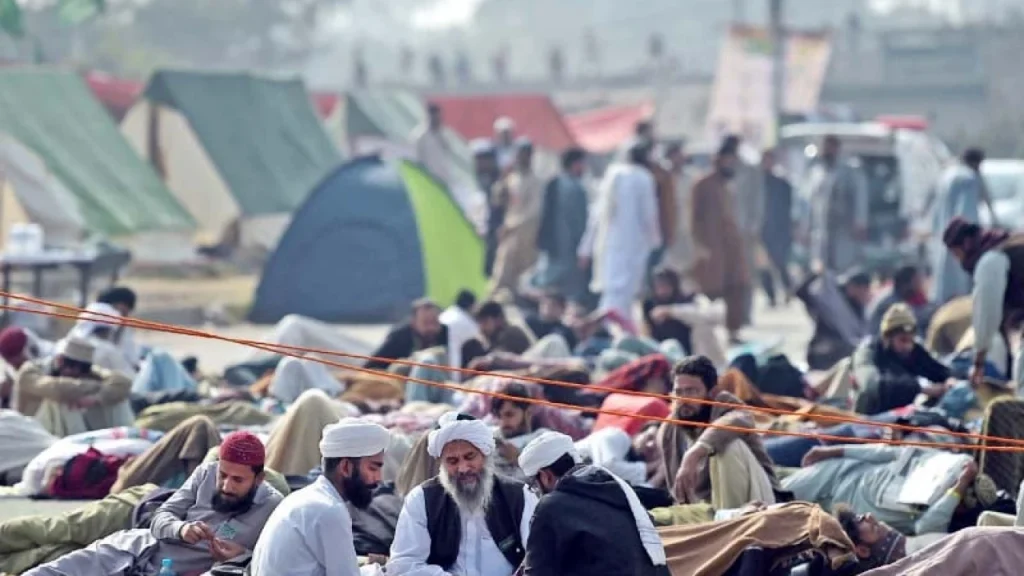Government forms fact-finding committee to find out who handled
Panel to assess as per “applicable laws, regulations and policies”.
AGP submitted govt’s implementation report in apex court today.
ECP also submitted its implementation report in SC a day earlier.
ISLAMABAD: The federal government Friday informed the Supreme Court about the formation of a fact-finding committee to investigate the “role and directions” of all “concerned” officials in management and handling the Faizabad sit-in.
The apex court was informed about the development in an implementation report submitted by Attorney General Mansoor Usman Awan today.
The report, submitted by the government, mentioned that the committee has been set up to identify those responsible for the 2017 sit-in, in line with the SC’s decision dated February 6, 2019.
In the last hearing of the case held on September 28, Chief Justice of Pakistan (CJP) Qazi Faez Isa-led three-member bench — while hearing the review petitions against the verdict on the Faizabad sit-in staged by the TLP in 2017 against the then-Pakistan Muslim League-Nawaz (PML-N) government — had expressed annoyance over the non-implementation of the years-old order and directed all the parties to submit their written replies by October 27.
A day earlier, the Election Commission of Pakistan (ECP) had also submitted its implementation report to the SC, complying with its aforementioned order.
In its report, the electoral body said: “As per record already submitted respondent no.3 [TLP] as a party is not involved in any terrorist activity and not proscribed.”
“We are of the view that responded no. 3 [TLP] is not involved in any anti-state activity or terrorism, hence at this stage the instant case is disposed of as withdrawn,” it added.
According to the implementation report, the fact-finding committee comprises senior officials from interior and defence ministries and Inter-Services Intelligence (ISI).
According to the terms of reference of the probe panel, it will collect evidence related to the Faizabad sit-in and review all the evidence, documents and records received in relation to the case.
The committee will record the statements of the witnesses and then assess the issue as per the “applicable laws, regulations and policies”; “determine the role/ directions of all concerned related to management and handling of the matter”; submit a report along with recommendations; and “look at any other point/ term related to the matter”.
As per the implementation report, the committee will also determine who gave orders and managed the Faizabad sit-in. The committee will then submit a report based on the recommendations collected following the investigation to the Ministry of Defence by December 1.
It added that if the committee needs more time, it will approach the defence ministry for it.
Through the implementation report, the SC was informed that the committee’s first meeting had already been held a day earlier on October 26 (Thursday) on the fixed TORs.
Faizabad sit-in case
This legal saga began on April 15, 2019, when the then-federal government, along with entities like the Ministry of Defence, Intelligence Bureau, then PTI government, AML chief Sheikh Rashid Ahmed, MQM-P, and the Pemra, among others, filed review pleas contesting the apex court’s judgement delivered by the incumbent Chief Justice Qazi Faez Isa regarding the Faizabad sit-in case.
Earlier on February 6, 2019, a two-member bench of the apex court comprising Justices Isa and Mushir Alam recommended that persons, issuing an edict or fatwa to harm another person or put another person in the harm’s way must be dealt with iron hand and prosecuted under relevant laws.
It also ruled that the intelligence agencies must not exceed their respective mandates. Later, the bench disposed of a suo moto case regarding the 2017 Faizabad sit-in staged by the TLP.
The 43-page verdict issued by the two-judge bench and published on the apex court’s website read: “Every citizen and political party has the right to assemble and protest provided such assembly and protest is peaceful and complies with the law imposing reasonable restrictions in the interest of public order.
The right to assemble and protest is circumscribed only to the extent that it infringes on the fundamental rights of others, including their right to free movement and to hold and enjoy property.”
In November 2017, the top court took suo motu notice of the three-week-long sit-in, which was held against a change in the finality-of-Prophethood oath, termed by the government as a clerical error, when the government passed the Elections Act 2017.
The sit-in was called off after the protesters reached an agreement with the government.

